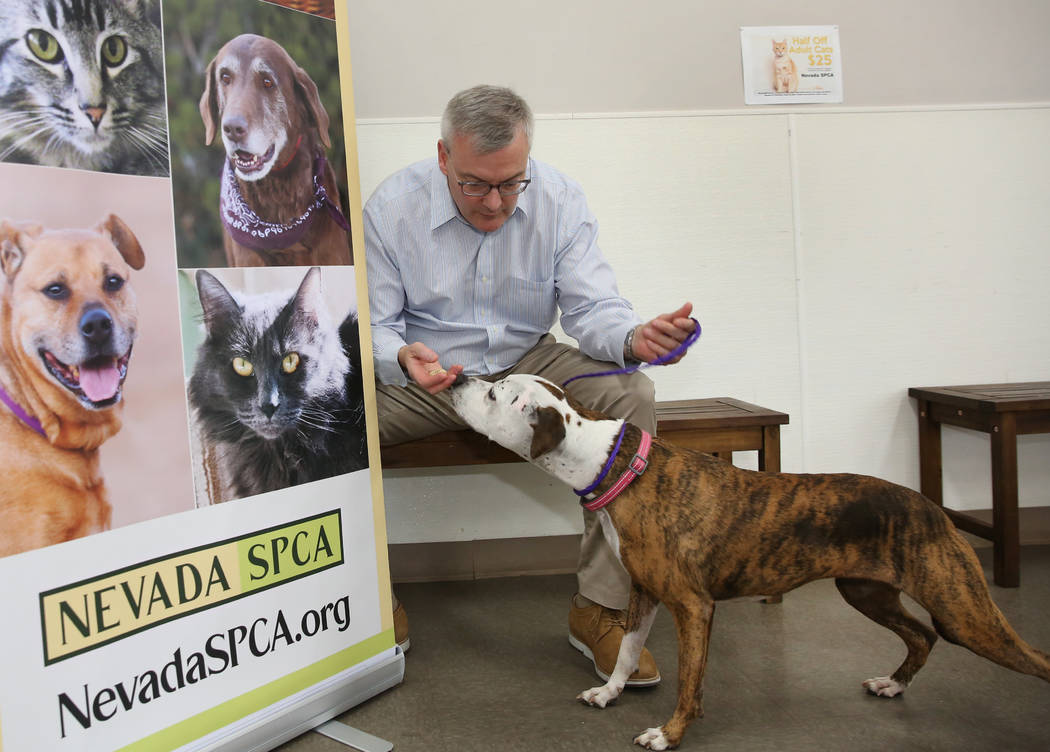New Nevada SPCA board president has decades in the industry
Thomas Moran, a native of Queens, New York, grew up on Long Island, went to law school in Illinois and has lived in about a half-dozen U.S. cities and in Dublin, Ireland — the last happy serendipity for someone who’d studied Irish history and culture.
An in-house corporate attorney for 30 years, Moran became corporate secretary/legal counsel for Southwest Gas Holdings six months ago. More recently, he was elected president of the board of the Nevada Society for the Prevention of Cruelty to Animals, following a rough patch for the organization.
Moran said he became aware of the troubled Nevada SPCA, which has been the focus of an investigation of possible misappropriation of funds, when seeing a news story on KTNV-TV, Channel 13. “They said the board had all resigned,” he said. Shelter operations had been turned over to Reno-based Humane Network after the board stepped down in April.
“It was unbelievable the gymnastics that had been going on,” Moran said. (Bonney Brown, president of the Humane Network, said that organization has hired an outside firm to conduct a review of the financial accounts and the state attorney general’s office has launched an investigation.)
The Nevada SPCA has been called the only no-kill shelter in Southern Nevada. Moran said animals are euthanized only if they’re injured or ill beyond hope of recovery or deemed unadoptable because of excessive aggression, and not because of overcrowding.
“We’re not a sanctuary,” he said, but “we do not euthanize as a space consideration. If you spend the time, you can find other alternatives. Shelters will move dogs and cats amongst each other.”
Typically, he said, the animals Nevada SPCA takes in have been abandoned or surrendered by their owners; it doesn’t have any government animal-control contracts. It is not part of the American Society for the Prevention of Cruelty to Animals and is privately funded.
“We’re stewards of other people’s money,” he said. “It’s our business to help as many animals as we can with the donations of other people and corporations.”
In the 30 years Moran has been involved with animal shelters, he’s seen profound changes.
“Shelter psychology and medicine have changed tremendously, even in the past 10 years or so,” he said. “It is a specialty in veterinary school now.”
Review-Journal: How have you been involved with communities where you’ve lived?
Thomas Moran: In 1989, right out of law school, I decided I wanted to do volunteer work. (He’s lived in about a half-dozen locations since then.) I began in Michigan, with Michigan Attorneys for Animals. In each location I’ve been in — including Dublin — I was either a director, and at one time the president, of SPCAs and humane societies. I also did work for PETA in the past.
Why did you want to work with animal-welfare organizations?
With animals, I just saw more of a need. I always felt very strongly that animals are not property, they’re not chattel — and they are in most states. I did legal work for PETA in Michigan around 1989. Automotive companies were still doing live-animal crash-testing. I wouldn’t put my name under everything that PETA does, but I think much of what they do is positive and necessary. I started shelter volunteering in Houston; I have 20 years volunteering in shelters. I just fell in love with cats. Since then I’ve had nothing but cats. (He currently has Kerry, a male domestic shorthair who came from the Animal Protective League in Cleveland and moved to Dublin and back with Moran and his wife, Margo.) I’ve worked with some (organizations) that were huge — Houston is large and they are extremely well-run — others that were smaller and needed a lot of help. Nevada SPCA falls in that category.
Why were you willing to get involved with a troubled organization?
My expertise is in corporate governance. My role on a board has largely been helping the board. We have nine new members on the board — nine wide-ranging new members. It’s a good board; we’ve had a couple of all-day meetings to get to know people. We have a new executive director, Lori Heeren. Almost the entire staff is new. The Humane Network and animal-behavior specialists are guiding us. This is really SPCA 2.0.
What do you see in the future of the Nevada SPCA?
We have a shelter. It’s good; it’s not great. It’s old. The building dates to the early ’80s. The capacity is about 150; portions are unused because there’s no air-conditioning. We would like the numbers to go up once we address some of the physical-plant issues. We’re working on a strategic plan — fundraising goals, what sort of animals to take, whether to have a veterinarian on staff. Perhaps a different location. It is an expensive process. We’re looking for more volunteers and foster homes.
Contact Heidi Knapp Rinella at hrinella@reviewjournal.com or 702-383-0474. Follow @HKRinella on Twitter.
Getting to know: Thomas Moran
Place you always take visitors
The Neon Museum, The Mob Museum, Bellagio — my wife and her sister are going to go to the spa there — and Red Rock.
Always in your fridge at home
Diet Coke, salads from Whole Foods, tuna, rice
Newest Las Vegas discovery
Local PBS programming, and the animal-welfare community, which is a well-organized community with a lot of big-hearted people.
Where would you live if not in Las Vegas?
Ireland






















